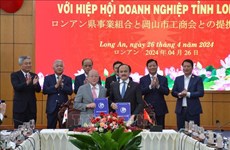Retailers ask for more policy support to tap potential
Domestic
retailers have called for policy support to help them exploit their
potential better, especially as they have to face fierce competition
from foreign counterparts.
Domestic
retailers have called for policy support to help them exploit their
potential better, especially as they have to face fierce competition
from foreign counterparts.
Statistics from the Ministry of Industry and Trade (MoIT) showed that the domestic retail sector contributed 14 percent to the country's GDP growth rate and had a scale equivalent to the export turnover of 2012.
By the end of last June, Vietnam had around 560,000 businesses operating in the domestic retail sector. Of these, direct retailers with foreign investment achieved the highest growth rate of 29 percent in the period 2011-13, though they accounted for just 3.46 percent. Domestic retailers saw 4.4 percent growth rate despite accounting for a high 9.8 percent.
Deputy Minister Ho Thi Kim Thoa was quoted by Thoi Bao Kinh Doanh (Business Times) as saying that the domestic retail sector had encouraged development and provided more opportunities to the customers in choosing products.
However, Thoa said the strong growth of foreign retailers has exposed the challenges faced by domestic ones, as their market share had increased from 1.2 percent in 1996 to 3.5 percent last year.
She said the Vietnamese retail model has been one of main reasons for its slow development. Its traditional markets, which provide 40 percent of the total goods value, have not established a systematic and stable model suited to each market.
Vo Van Quyen, head of the ministry's Domestic Market Department, said the domestic retail system had many intermediates. He added that the sector lacked policy support, besides having shortcomings such as small capital scale and lack of high quality human resources.
He said this was the reason that the sector was not strong enough to compete with the foreign competitors.
Agreeing with these ideas, Dinh Thi My Loan, Chairwoman of the Vietnam Retailers Association (VRA), told Vietnam News that the country should have strong policies and regulations which would not go against the commitments of the World Trade Organisation and the Free Trade Agreement and would support associations and enterprises in human training, market researches and buying trends.
"The State agencies should focus on building 20 leading domestic retailers which have increasing added value," Loan said.
She added that support for land and the links between production and customers should also be given to promote the domestic retail sector.-VNA
Statistics from the Ministry of Industry and Trade (MoIT) showed that the domestic retail sector contributed 14 percent to the country's GDP growth rate and had a scale equivalent to the export turnover of 2012.
By the end of last June, Vietnam had around 560,000 businesses operating in the domestic retail sector. Of these, direct retailers with foreign investment achieved the highest growth rate of 29 percent in the period 2011-13, though they accounted for just 3.46 percent. Domestic retailers saw 4.4 percent growth rate despite accounting for a high 9.8 percent.
Deputy Minister Ho Thi Kim Thoa was quoted by Thoi Bao Kinh Doanh (Business Times) as saying that the domestic retail sector had encouraged development and provided more opportunities to the customers in choosing products.
However, Thoa said the strong growth of foreign retailers has exposed the challenges faced by domestic ones, as their market share had increased from 1.2 percent in 1996 to 3.5 percent last year.
She said the Vietnamese retail model has been one of main reasons for its slow development. Its traditional markets, which provide 40 percent of the total goods value, have not established a systematic and stable model suited to each market.
Vo Van Quyen, head of the ministry's Domestic Market Department, said the domestic retail system had many intermediates. He added that the sector lacked policy support, besides having shortcomings such as small capital scale and lack of high quality human resources.
He said this was the reason that the sector was not strong enough to compete with the foreign competitors.
Agreeing with these ideas, Dinh Thi My Loan, Chairwoman of the Vietnam Retailers Association (VRA), told Vietnam News that the country should have strong policies and regulations which would not go against the commitments of the World Trade Organisation and the Free Trade Agreement and would support associations and enterprises in human training, market researches and buying trends.
"The State agencies should focus on building 20 leading domestic retailers which have increasing added value," Loan said.
She added that support for land and the links between production and customers should also be given to promote the domestic retail sector.-VNA













